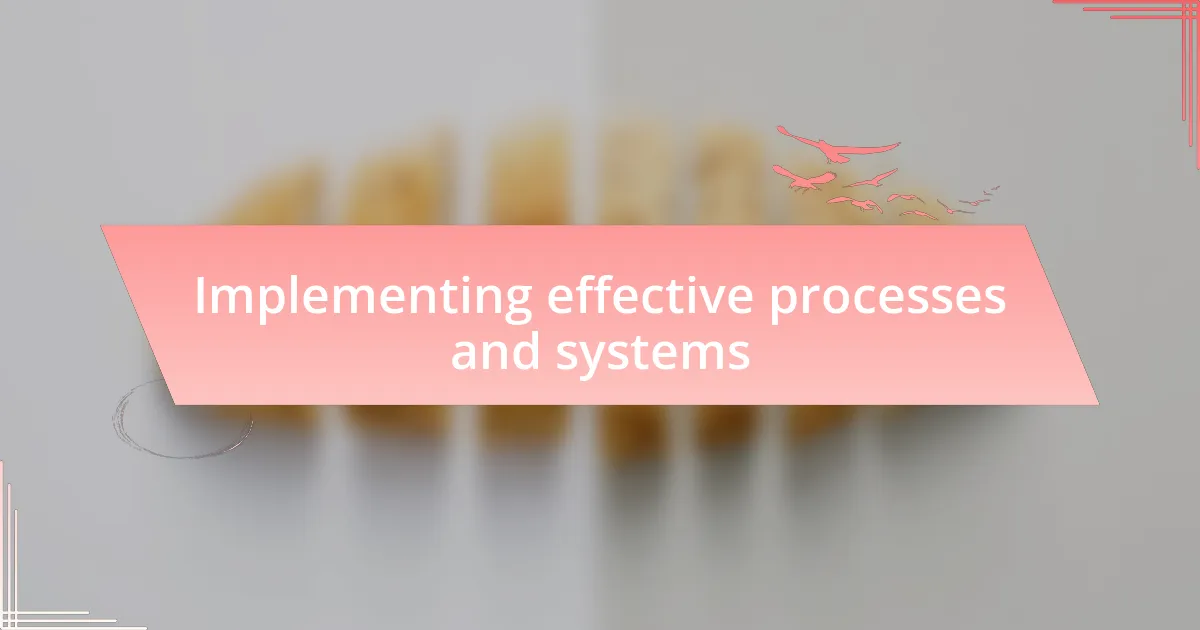Key takeaways:
- Embracing technology, such as digital inventory management systems, enhances operational efficiency and reduces waste.
- Strong internal communication and open dialogue among team members are crucial for navigating operational challenges effectively.
- Prioritizing and valuing feedback from customers and staff can lead to innovation and improved service.
- Continuous training and developing clear processes safeguard quality and operational resilience within the food business.

Strategies for overcoming operational challenges
One effective strategy I’ve found for overcoming operational challenges in the food business is to embrace technology. For instance, I implemented a digital inventory management system that drastically reduced food waste. Have you ever wondered how much money is lost through outdated methods? Streamlining operations through tech not only enhances efficiency but also fosters a more sustainable approach.
Communication within the team is another cornerstone of overcoming hurdles. When I faced a sudden staff shortage during peak hours, we held quick huddles to reorganize roles on the fly. This taught me the value of open dialogue; aligning everyone towards a common goal can transform a crisis into an opportunity for teamwork and adaptability. How often do we underestimate the power of a well-timed conversation?
Lastly, prioritizing feedback from both customers and staff has been a game changer for me. I remember a time when a simple comment from a regular about our menu led to a complete revamp that attracted new clientele. Isn’t it fascinating how listening can yield unexpected rewards? Creating a culture where feedback is valued fosters innovation and helps preempt operational challenges before they escalate.

Implementing effective processes and systems
Implementing effective processes and systems is crucial for any food business striving for success. I recall when I first integrated a scheduling software for my staff. It seemed like a minor adjustment at the time, but the smoothness of our shifts improved dramatically. Have you ever experienced the chaos of overlapping schedules? That simple change eliminated confusion and led to happier employees who felt supported in their roles.
Moreover, I’ve learned that standard operating procedures (SOPs) are invaluable. Developing clear guidelines for everything from food preparation to customer service ensures consistency in quality, which is essential in the food industry. I once witnessed a drop in customer satisfaction because our new cooks weren’t familiar with the methods we had established. It drove home the point that a well-documented process not only empowers staff but also safeguards the reputation of the business.
Finally, I can’t stress enough the importance of continuous training. After implementing new systems, I make it a priority to hold regular training sessions to keep everyone up to speed. I fondly remember a workshop where we explored innovative cooking techniques together, and the spark of creativity it ignited within the team was truly remarkable. How often do we take the time to invest in our people? By developing our skills collectively, we strengthen our processes and enhance our operational resilience.

My personal experience with challenges
I faced a significant hurdle when we scaled up our production to meet increasing demand. Balancing quality with quantity felt like walking a tightrope. I remember the anxiety that plagued me every time we received feedback about inconsistent flavors in our dishes. It reinforced my belief that, in the food industry, every ingredient and every step counts.
Then there was a period when our supplier faced delays, causing panic among my team and customers alike. I can still recall the tension in the kitchen as we scrambled to devise alternatives. That experience taught me the importance of building strong relationships with multiple suppliers and having contingency plans in place. Without flexibility, a temporary setback can feel like an insurmountable roadblock.
One of the most surprising challenges arose during a busy holiday season. We were overwhelmed with orders, and I felt the pressure mounting as stress levels rose among the staff. I took a moment to step back and implemented a quick huddle to reassign tasks based on everyone’s strengths. I’ll never forget the relief on their faces as we worked together more effectively. It reminded me that sometimes the best solution comes from collaboration rather than top-down directives.

Lessons learned from operational issues
Operational issues can really shape how we run our food business, and I’ve certainly learned invaluable lessons from them. One time, after a major kitchen equipment failure during peak hours, I found myself in a crisis that tested our limits. That experience highlighted the critical need for regular maintenance and backups; now, I ensure we schedule routine checks because I’d never want to feel that level of panic again.
I’ve also learned the hard way about the importance of clear communication. During a particularly chaotic catering event, a breakdown in communication led to incorrect orders being sent out. I remember the sinking feeling when customers expressed their disappointment. This incident pushed me to enhance our system for order management and reinforced the idea that transparency among team members is essential for smooth operations.
Reflecting on past challenges, I realized that there’s a silver lining to every setback. When an unexpected health inspection caught us off guard, we tightened up our protocols and approached the entire team for input. The collaborative effort not only boosted morale but also empowered everyone to take ownership of our standards. How often do we embrace the lessons hidden within our challenges? For me, it’s become a vital part of our growth journey.

Future plans for operational success
Looking ahead, I’m particularly focused on integrating technology to streamline our operations. A few months ago, we implemented a new inventory management system that has significantly reduced waste and improved ordering accuracy. I often wonder, how much more efficient could we be with the right tools in place? This experience has made me eager to explore even more automation options to enhance our efficiency and customer satisfaction.
Training is another key area where I see room for growth. I want to create more comprehensive training programs that not only cover technical skills but also foster a sense of teamwork and camaraderie among staff. During a busy season, I recognized how a lack of confidence could lead to errors that cost us time and money. By investing in our team’s growth, I believe we can cultivate an environment that encourages everyone to contribute ideas and share solutions when challenges arise.
I also plan to emphasize sustainability in our operations. After attending a seminar on eco-friendly practices, I was inspired to rethink our waste management and sourcing strategies. I’m excited about the potential partnerships with local farms that can reduce our carbon footprint while also providing fresh ingredients. Isn’t it rewarding to know our efforts can have a positive impact on the community and the environment? I genuinely believe that aligning our values with our operational goals could set us apart in the competitive food business landscape.